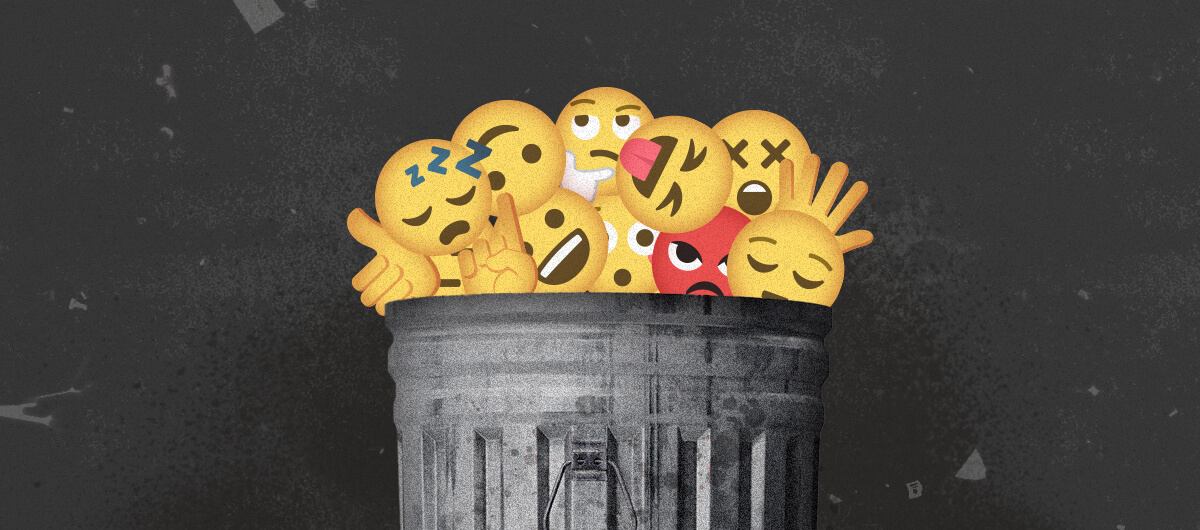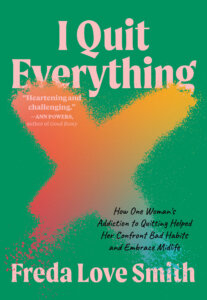

First Person
I Quit Social Media and Lived to Tell
In this excerpt from the memoir I QUIT EVERYTHING, the Gen-X writer—a retired drummer and vocalist for several alt rock bands—reflects on the addictive nature of social media, and the liberation of signing off.
This article was made possible because of the generous support of DAME members. We urgently need your help to keep publishing. Will you contribute just $5 a month to support our journalism?
I Quit Everything documents my extended experiment in hitting pause on a long list of addictive habits, all of which had escalated in intensity during the height of the pandemic lockdown. After quitting booze, sugar, weed, and caffeine, I axed social media. This excerpt follows a discussion of the philosophical thought experiment attributed to George Berkeley, a 16th-century Anglican Bishop: “If a tree falls in the forest, and there’s no one there to hear it, does it make a sound?” If I’m not scrolling and posting, am I even real? —Freda Love Smith
Social media was the fifth of five things I quit over a five-month period. I knew withdrawal by now. Everything about social media is addictive, even the negative stuff: the unfavorable comparisons between other people’s families and mine; the insecurity wrought by a pretty yoga instructor with toned arms. I was hooked by all of this. Even more powerful is the positive stuff, the hit of dopamine that lights me up when someone tags my band, posts a picture of my book, shares my photo of blueberry pie.
It’s a myth though, that the rush we get from technology use is directly comparable to a drug high. In Child Data Citizen, Veronica Barassi explains that social media use increases dopamine release by 50 to 100 percent, while cocaine increases it by 350 percent. “People who claim that brain responses to technologies and drugs are similar are trying to liken the drip of a faucet to a waterfall.” But those drips have a special power, compelling us to return frequently for another little hit, and that frequency gives the platforms more of a chance to accumulate information about our lives and interests. The better they know us, the better armed they are to cater to our tastes. It’s a different kind of addiction, a complex and nuanced relationship surpassing anything cocaine has to offer.
My brain had undoubtedly been rewired by hours on social media. I had a vague sense that the habit was damaging, and boy was I right. Research on social media effects shows that its use reduces attention span, impairs emotional and social intelligence, increases our sense of isolation, interferes with cognitive and brain development, and disrupts cycles of sleep.
I’d been worried that weed was damaging my brain—social media was a more likely culprit. You’d think that learning about all this would make it easy to quit, but it didn’t; it was hard to let go. If alcohol represented looseness and cool; sugar pleasure and delight; weed magic; and caffeine achievement and focus; social media was attention, validation, and sometimes even connection. It was a lot to give up, all that pain and pleasure.
I finally shook the Facebook monkey off my back, and the main thing I discovered when I straightened up and looked around was time. So much time. I hadn’t realized how unconscious my habit had been—I’d drifted to Facebook when I was bored, aimless, or avoiding hard work. It was my prime means of procrastination, and without accomplishing a thing, sometimes without even engaging with a single post, an hour would disappear. Two hours.
I’ve tended to think of time as something personal, something meaningful and valuable to me, something I seize or waste or lose track of on my own, but time transcends the individual; it is a key asset in capitalism and always has been. Barassi writes that the history of capitalism is defined by the practice of controlling people’s “temporal behaviors.” Industrialization couldn’t have happened without clock time. Before the 14th century, time in Europe was organized around the movement of the sun in the sky, the turning seasons, and the accompanying rituals and festivals of the day and year. Clocks allowed institutions like factories and schools to use rewards and punishments to control workers and students.
According to Marx, clock time organized and managed labor, and time regulation was fundamental to the assembly lines and productivity of Fordism. It’s easy to focus on our own individual compulsion and addiction around social media, but in this current stage of capitalism—surveillance capitalism, platform capitalism, whatever you want to call it—there are political and economic forces driving every online interaction. If nobody slows down and looks at your post, if nobody clicks or shares or writes or otherwise responds to it, it has no value. The tree has made no sound. Your data is the “new oil,” and Facebook needs it, needs to store, process, and sell this data. And the acquisition of it requires your participation and time. Lots of time.
After I quit, days were longer and more open, I was less likely to wonder at night what the hell I’d done with an entire day. I continued to reach reflexively for my phone, but instead of staring into Instagram, I redirected myself to an article or essay. In the tiniest of revolutions, I’d won a battle against surveillance capitalism. I won back some time.
I also rediscovered my attention span. My ability to focus had been slowly eroding as I skipped mindlessly across the internet. Now it was a little easier to sustain intent, to finish reading what I started and not distractedly drift away.
I bought less stuff too, without those rabbit hole experiences of chasing a cute pair of boots to a commercial website. It was nice to take a break from that, the way that pair of boots follows me around, marching all over my Facebook feed forever until I finally relent and buy them.
And I found a healthy distance from the noise of the online world. This reminded me of being a kid, when sometimes I’d sit in a closet with a book, blanket, and flashlight: nowhere to be, nobody to answer to, oblivious to the machinations of culture.
Being off Facebook also reminded me of another childhood experience: I once ran away from home for a day, mad at my mom about something. When I came home that night, hungry for dinner, nobody had even noticed that I was gone. I thought they’d all be worried sick. Similarly, nobody noticed I was off Facebook, which reinforced what a nonentity I’d been there. I was OK with that—the world spins along without us, we are free to retreat. And was I really missing anything important?
No and yes. Friends played gigs, celebrated birthdays, adopted puppies. Major shit was happening. Not only to other people but to me, too: My band celebrated the release of our CD after over a year of pandemic delay. I finished an MFA in creative nonfiction. Just like I was disoriented by not celebrating with alcohol, so too was it destabilizing to not share a happy Facebook post. With apologies to Bishop Berkeley: If a great thing happens, and you don’t post about it on Facebook, did it really happen?
When my dear friend Faith Kleppinger—writer, musician, one of the best humans I’ve ever known—died a few days after her 50th birthday, I coped without posting about it. If a bad thing happens, and you don’t post about it on Facebook, did it really happen?

Reprinted with permission from I Quit Everything: How One Woman’s Addiction to Quitting Helped Her Confront Bad Habits and Embrace Midlife, by Freda Love Smith, Agate, September 2023.
Before you go, we hope you’ll consider supporting DAME’s journalism.
Today, just tiny number of corporations and billionaire owners are in control the news we watch and read. That influence shapes our culture and our understanding of the world. But at DAME, we serve as a counterbalance by doing things differently. We’re reader funded, which means our only agenda is to serve our readers. No both sides, no false equivalencies, no billionaire interests. Just our mission to publish the information and reporting that help you navigate the most complex issues we face.
But to keep publishing, stay independent and paywall free for all, we urgently need more support. During our Spring Membership drive, we hope you’ll join the community helping to build a more equitable media landscape with a monthly membership of just $5.00 per month or one-time gift in any amount.



















































































